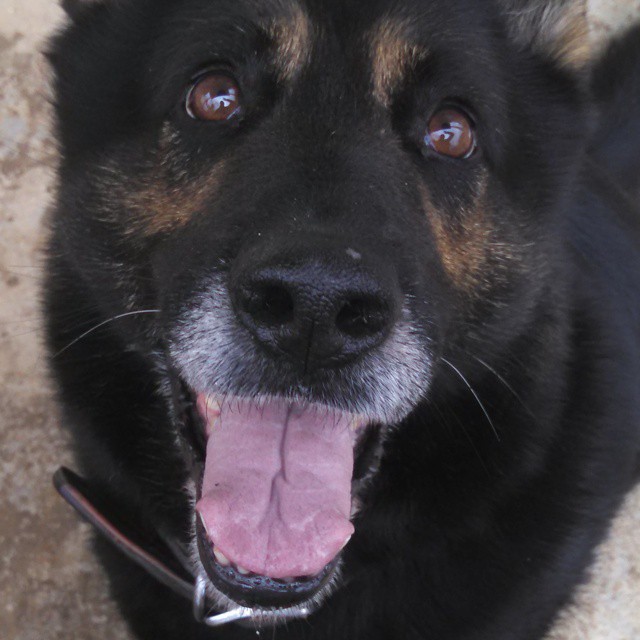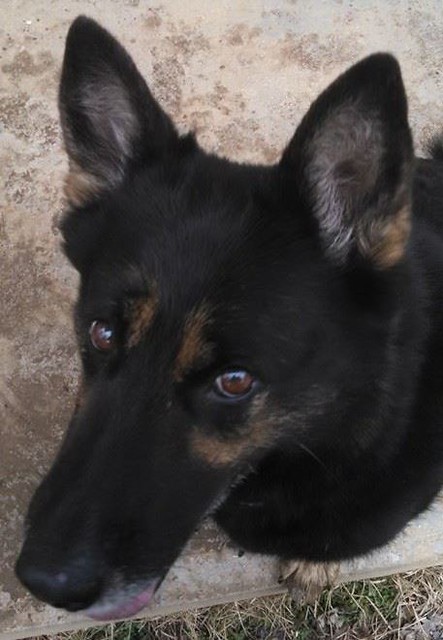
When I first met Xita vom Ludwigseck back in June of 2010, she had just turned 3 years old, pregnant with her first litter, and had recently been imported from Germany by my friend Christine. A stranger in a strange land, Xita was a very correct German Shepherd in every particular, polite to strangers but not really interested in them. Her muzzle was just barely touched with grey on the end, the result of a gene in German Shepherds that results in premature grey and leaves dogs looking distinguished at a young age.
At the time, I was becoming progressively more disabled from chronic pain and mental illness that I’d carried out of my time spent in the US Navy during Operation Iraqi Freedom. I was experimenting with using a dog to assist with my mobility, using my long-suffering male Doberman, and finding it incredibly helpful. I looked into every program I could find that trained service dogs, but not one of them trained mobility dogs AND placed dogs in a home that already had pet dogs. Since you can pry my cherished dogs from my cold dead hands but not before, I was left floundering.
My first rescue came in the form of a small black male puppy that Xita delivered on the Fourth of July, apparently getting into her new American citizenship with a bang. I dithered and hesitated, but when Sid’s first home didn’t work out and Christine told me he was coming back to her, I laid claim to a gawky six month old. As he got old, I started training him to work in public to support my mobility needs, and then as my mental health got dicier, I began teaching him what I needed from a dog to keep me from losing myself to the myriad of problems that come with Post-Traumatic Stress Disorder.
Sid was my lifeline for two years, keeping me upright, walking and sane. Having him beside me felt like being enabled again. It felt like flying. And then I came crashing to the ground when his own medical problems meant he had to retire from public work at just four years old. I could gimp around with my cane, certainly, but without what I’d come to affectionately call a “thinking brain dog” (Any other Pratchett fans out there?) I was naked and lost. I stopped leaving the house for anything but essentials and made my trips quick and furtive, retreating back to hide behind closed curtains in an environment I could mostly control.
My beloved friend saw me hurting, and then in an act of greatest love and generosity, she and Xita saved me a second time, when during a visit to her house she asked, “Why don’t you see if Xita wants to work with you?” I’d spent five years at this point watching Xita bloom from a young dog, figuring out this great change in her life, to a mature dog with a keen sense of fairness, a hilarious sense of humor, and a firm adherence to the German Shepherd motto, “do right and fear no one.” I’d watched her mother her pups, and get started learning to herd. We had made friends, but she wasn’t my dog and I wasn’t her person.
I was hesitant, still raw from retiring Sid. Many of us know what it’s like to love a pet and have that pet become part of your life, but the bond between a handler and service dog is much more intimate. Your dog becomes an integral part of you, like your leg, or an outrigger on a canoe. But I knew I needed a dog, and I knew Xita, and I knew that one of Christine’s most amazing talents is the ability to discern which dog and which person will be good for one another. And so, even though I didn’t trust myself, I trusted Christine and I trusted Xita.
I asked Xita to perform the basic tasks I needed from a psych service dog to keep me grounded, present, and not panicking. She thought they were great fun and wanted to do more. I asked her to wear a harness identifying her as a service dog, and she handled it like she’d been wearing one her whole life. I ran her through the Assistance Dogs International Public Access Test and she aced it. Emboldened by her start on herding, I made her the Official Chore Dog and asked her to push goats back from feeding troughs while I distributed grain. She was brilliant, and feeding the goats was faster, easier and safer. We were learning to work together, and forming a team, and whatever I asked of Xita, she gave it her best effort.

Xita and I have been working together now for five months. Her late-life career change hasn’t fazed her a bit, but makes a world of difference to me. It’s had totally unexpected benefits, too: Xita deeply disapproves of smoking, and my cigarette intake has drastically dropped. For a long time, every time we visited Christine, though, Xita wouldn’t come to my car without Christine walking out there with us, and used each visit to “catch up”, letting me interact with the other dogs without jealousy. But on our last visit, Xita didn’t like other dogs coming over to get love, and when it was time to go home she trotted to my car and hopped in without a backward look. Christine smiled at us and said, “She’s decided she’s your dog.”
It was just as well, really. She’s the right dog at the right time and place, and I’ve been her person for months now.
Andrea Chandler is a disabled Navy veteran who is living the dream on a tiny farm in the Piedmont. In her spare time she reads everything she can get her hands on; spins, dyes, and knits her own yarn; makes soap and lotion from goat milk; and wages an endless battle with the squirrels who raid her garden. You can find her on Twitter as @civilwarbore.

[…] I’ve been writing for the Piedmont Virginian’s blog. My most recent piece is about my current service dog, […]